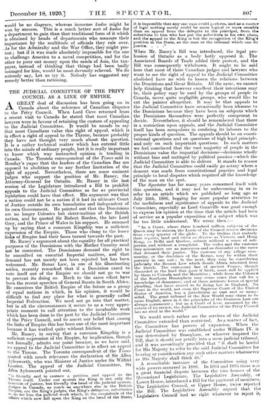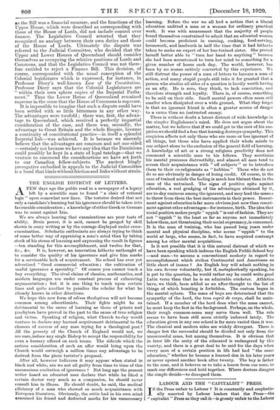THE JUDICIAL COMMITTEE OF THE PRIVY COUNCIL AS A LINK
OF EMPIRE.
AGREAT deal of discussion has been going on in Canada about the reference of Canadian disputes to the Privy Council. When Lord Cave returned from a recent visit to Canada he stated that most Canadian lawyers were in favour of retaining the custom of appealing to the Judicial Committee. It would be unsafe to say that most Canadians value this right of appeal, which is in effect a right of appeal to the Throne, because probably they have not thought very much about the question. It is a rather technical matter which has entered little into the minds of ordinary people, but it is really important to know which way instructed opinion is tending in Canada. The Toronto correspondent of the Times said in Monday's paper that the leaders of the Canadian Bar are opposed to abolition or to any further limitation of the right of appeal. Nevertheless, there are some eminent judges who support the position of Mr. Raney, the Attorney-General for Ontario. Mr. Raney in the last session of the Legislature introduced a Bill to prohibit appeals to the Judicial Committee so far as provincial legislation could have that effect. His argument was that a nation could not be a nation if it had its ultimate Court of Justice outside its own boundaries and independent of its own Government. He pointed out that the Dominions are no longer Colonies but sister-nations of the British nation, and he quoted Sir Robert Borden, the late Lord Grey, and the Prince of Wales in his support. He summed up by saying that a common Kingship was a sufficient expression of the Empire. Those who clung to the lesser links of Empire had their faces turned towards the past. Mr. Raney's argument about the equality for all practical purposes of the Dominions with the Mother Country need not be contested. The Dominions demand the right to be consulted on essential Imperial matters, and that demand has not merely not been rejected but has been welcomed. Mr. Boner Law, in one of his illuminating asides, recently remarked that if a Dominion cared to vote itself out of the Empire we should not go to war to prevent its doing so. Much to the same effect have been the recent speeches of General Smuts in South Africa. He conceives the British Empire of the future as a group of equal nations in which, in his opinion, it would be difficult to find any place for what is generally called Imperial Federation. We need not go into that matter, but in all the circumstances it seems to us a very appro- priate moment to call attention to the invaluable work which has been done in the past by the Judicial Committee of the Privy Council, and to assert our belief that among the links of Empire this has been one of the most important because it has worked quite without friction.
Mr. Raney, in sayine that a common Kingship is a sufficient expression of the Empire, by implication, though not formally, admits our point because, as we have said, an appeal to the Judicial Committee is in effect an appeal to the Throne. The Toronto correspondent of the Times quoted with much relevance the declaration of Sir Allen Aylesworth, who was Minister of Justice under Sir Wilfrid Laurier. The appeal of the Judicial Committee, Sir Allen Aylesworth pointed out,
"is literally and in essence a petition and appeal to the Throne itself. Under our system the King is not only the fountain of justice, but literally the head of the judicial system. Judges in Canada, as much as anywhere else in the British ff'gre, are the King's judges, the King's delegates, substitutes
is for him the judicial work which, in the magnitude of the affairs which now Sall upon the King as the head- of the State, it is impossible that any one man could perform, and as a matter of logic nothing surely could be more logical or more sensible than an appeal from the delegate to the principal, from the substitute to him who has put the substitute in his own Mace, and the appeal to the King is but the recognition of the King'it position in the State, as the man or the tribunal which can do justice. . . ."
When Mr. Raney's Bill was introduced, the legal pro- fession of Ontario as a body hotly opposed it. The Associated Boards of Trade added their protest, and the Bill was consequently withdrawn. It ought to be said here that most of those Canadian judges and lawyers who want to see the right of appeal to the Judicial Committee abolished have no wish to loosen the relations between the Dominions and Great Britain. All the same, we cannot help thinking that however excellent their intentions may be, their policy may be used by the groups of people in Canada, never quite negligible groups, who would like to cut the painter altogether. It may be that appeals to the Judicial Committee have occasionally been irksome to the Dominions because they have been on subjects which the Dominions themselves were perfectly competent to decide.. Nevertheless, it should be remembered that there is a restriction upon appeals, and the Judicial Committee itself has been scrupulous in confining its labours to the proper kinds of question. The appeals should be on consti- tutional questions and on questions of high legal principle, and only on such important questions. In such matters we feel convinced that the vast majority of people in the Dominions value the impartial decisions—decisions wholly without bias and untinged by political passion—which the Judicial Committee is able to deliver. It stands to reason that the Judicial Committee could easily go astray where a descent was made from constitutional practice and legal principle to local disputes which required all the knowledge of the man on the spot. The Spectator has for many years concerned itself with this question, and it may not be unbecoming in us to refer to an article which we published as long ago as July 24th, 1886, begging for more popular attention to the usefulness and significance of appeals to the Judicial Committee, especially as Lord Granville was good enough to express his opinion at the time that the article had been of service as a popular exposition of a subject which was far too little understood. We wrote then :—
"In a Court, where three hundred million subjeete of the Queen may be suitors, the Lords of the Council review decisions from every quarter of the globe. To the Orders that embody their reports, land and cities as dive, se as Victoria and Hong Kong, us Delhi and Quebec, submit without a sense of sub- jection and without a complaint. The codes and the customs they administer are as numerous and as dissimilar as the races that demand their justice. Tho customs of any village com- munity, or the doctrines of the Koran, may be within their purview in one suit ; in the next, they may be considering judicially the Roman Law which South Africa inherited from the Dutch. The customary law of ancient France, though discarded in the land that gave it birth, must still be applied by them to Canada and the Mauritius ; while from the Colonies of the Southern Hemisphere may come cases that call for as knowledge of demurrers, and of those intricate forms of special pleading, that have ceased to be living law in England. No Court in the world, not even the Supremo Court of the United States of America, has a jurisdiction so vast and so many- sided. Tho great tribunal of the New World may claim to ho more English, since in it the principles of the Common Law are always paramount ; but as a Court of Law, measured by the extent of its review, the Judicial Committee of the Privy Council has no rival in the world."
We would much rather see the services of the Judicial Committee extended than restricted. As a matter of fact., the Committee has powers of expansion. When the Judicial Committee was established under William IV. it was determined by Brougham, or whoever inspired the Bill, that it should not petrify into a mere judicial tribunal, and it was aceonlingly provided that " it shall be lawful for His Majesty to refer to the said Judicial Committee for hearing or consideration any such other matters whatsoever as His Majesty shall think fit."
A remarkable instance of the Committee using very wide powers occurred in 1886. In 1884 and 1885 there was a great financial dispute between the two houses of the Queensland Legislature. The Legislative Assembly, or Lower House, introduced a Bill for the payment of members. The Legislative Council, or Upper House, twice rejected the Bill. The Legislative Assembly argued that the Legislative Council had no right whatever to reject it, as the Bill was a financial measure, and the functions of the Upper House, which were described as corresponding with those of the House of Lords, did not include control over finance. The Legislative Council retorted that they recognized no analogy between their own duties and those of the House of Lords. Ultimately the dispute was referred to the Judicial Committee, who decided that the Upper and Lower Houses of Queensland should consider themselves as occupying the relative positions of Lords and Commons, and that the Legislative Council was not there- fore entitled to reject a Finance Bill. This decision, of course, corresponded with the usual conception of the Colonial legislatures which is expressed, for instance, in Professor Dicey's well-known Law of the Constitution. Professor Dicey says that the Colonial Legislatures are " within their own sphere copies of the Imperial Parlia- ment." Thus the Lower House of Queensland remained supreme in the sense that the House of Commons is supreme. It is impossible to imagine that such a dispute could have been settled with so little bitterness in any other way. The advantages were twofold ; there was, first, the advan- tage to Queensland, which received a perfectly impartial consideration of the case, and there was, secondly, the advantage to Great Britain and the whole Empire, because a continuity of constitutional practice—in itself a splendid Imperial link—was achieved. It is because we sincerely believe that the advantages are common and not one-sided —certainly not because we have any idea that the Dominions could possibly be kept in a state of legal tutelage—that we venture to commend the considerations we have set forth to our Canadian fellow-subjects. The ancient kingly prerogative embodied in appeals to the Judicial Committee is a bond that binds without friction and links without strain.







































 Previous page
Previous page